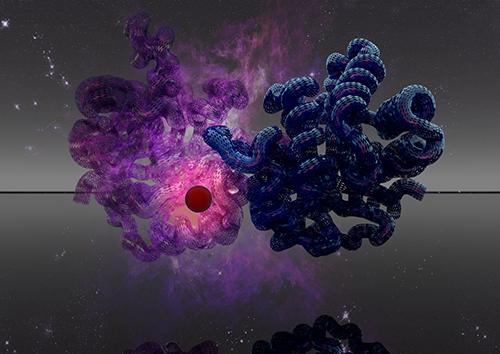About Northwestern Proteomics

Northwestern Proteomics, a Proteomics Center of Excellence within the Chemistry of Life Processes Institute (CLP), is the leading lab in the world for the top-down proteomics approach. Neil L. Kelleher, PhD, Director of CLP and Northwestern Proteomics has been successful in driving both technology development and applications of very high-performance mass spectrometry in chemistry and biology. For almost 20 years, he has worked to develop an innovative a set of tools and methodologies to identify proteoforms, or specific molecular forms of a protein product, arising from a specific gene.
Most proteomics researchers are attempting to determine the composition of proteins and identify their role in determining diseases through a bottom-up approach that breaks down proteins into small units to partially analyze. This approach, however, is incomplete. Kelleher and his team have pioneered a groundbreaking new method for measuring intact proteins in the mass spectrometer known as top-down proteomics. It offers tremendous insight into the proteoforms which are associated with health outcomes or particular diseases.
Unlocking a deeper understanding of how proteins function within the human body underlies the mission of Northwestern Proteomics. Although the completion of the Human Genome Project in 2002 transformed our knowledge of the role that genetics plays in the scientific makeup of humans, studies now point to proteins, not genes, as the main drivers of human health and complex diseases. When proteins change or confront a challenging environment, disease becomes more likely.
Pushing the Boundaries of Science
Northwestern Proteomics’ National Resource for Translational and Developmental Proteomics (NRTDP). pushes the boundaries of precision proteomics with new technologies and approaches to deciphering the biology behind heart disease, cancer, neurological diseases and immuno-disorders. Through a number of outreach programs, the Resource fosters education and community engagement.
The Human Proteoform Project & Atlas
Northwestern Proteomics is at the forefront of the The Human Proteoform Project (HPfP), a game-changing initiative to identify all one billion proteoforms present in all types of human cells and fluids. Kelleher co-founded the Consortium for Top-Down Proteomics to coalesce support for this bold initiative among academic institutions, corporations, and government agencies.
Integral to the project is the development of the Human Proteoform Atlas, a database developed and maintained by Northwestern Proteomics that provides a central location for scientists to browse proteoforms and contribute their own datasets. This information will reveal why proteins follow or diverge from their biological instructions and provide the key to developing more targeted and effective diagnostics and treatments for disease.
Advancing Human Health
Northwestern Proteomics partners with more than 100 Northwestern labs on the Chicago and Evanston campuses. In the last four years, the Center has interacted with nearly 200 Northwestern investigators, ranging from simple, core work to deep, long-term collaborations.
Our goal is to develop new proteomics technologies, apply them to timely questions in basic, translational, and clinical research, and educate the scientific community at large about our research findings.


